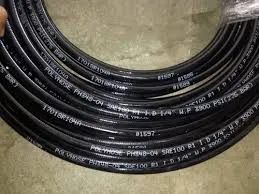ທ.ວ. . 02, 2024 06:40 Back to list
Top Rated Hydraulic Hoses for Outstanding Heat Resistance and Durability in Extreme Conditions
The Best Heat Resistant Hydraulic Hose A Comprehensive Guide
Hydraulic hoses are essential components in various industrial applications, conveying pressurized fluids to power machinery and equipment. One crucial characteristic of these hoses is their resistance to heat. In environments where high temperatures are prevalent, selecting the right heat-resistant hydraulic hose can significantly affect the efficiency, safety, and longevity of your operations. This article explores the key features of heat-resistant hydraulic hoses, their applications, and guidance on choosing the best options for your needs.
Understanding Heat Resistance in Hydraulic Hoses
Heat-resistant hydraulic hoses are designed to withstand elevated temperatures without compromising flexibility, durability, and pressure ratings. Standard hydraulic hoses may fail when exposed to high heat, leading to leaks, ruptures, or even catastrophic equipment failures. The ability to resist heat extends the hose's lifespan and ensures reliable operation in challenging environments.
The heat resistance of hydraulic hoses is primarily influenced by the materials used in their construction. Common materials include rubber compounds, thermoplastic elastomers, and metal reinforcements. Each type offers distinct benefits depending on the specific heat and pressure conditions they will face.
Key Features of Heat Resistant Hydraulic Hoses
1. Material Composition The best heat-resistant hydraulic hoses are often made from high-quality synthetic rubber or thermoplastic materials. These compounds are specifically engineered to resist high temperatures and provide excellent flexibility and resilience under pressure.
2. Temperature Rating Hydraulic hoses come with specified temperature ratings, typically ranging from -40°F to +250°F (-40°C to +121°C), though some specialized hoses can withstand temperatures above 300°F (149°C). It’s essential to choose a hose that meets or exceeds the temperature expectations of your application.
3. Pressure Rating In addition to heat resistance, the pressure rating of the hydraulic hose is crucial. A high temperature can impact the hose's ability to handle pressure; therefore, selecting a hose that meets the pressure requirements for your system is essential.
4. Reinforcement Many heat-resistant hydraulic hoses are reinforced with steel wire or other materials to enhance their strength and durability. This reinforcement allows the hose to maintain its shape and integrity under extreme pressure and heat.
5. Crush and Abrasion Resistance In industrial environments, hoses are often subjected to physical damage from crushing, abrasion, and environmental factors. The best heat-resistant hydraulic hoses will feature protective coverings to mitigate these risks.
Applications of Heat Resistant Hydraulic Hoses
best heat resistant hydraulic hose

Heat-resistant hydraulic hoses are commonly employed in sectors such as
- Automotive Industry These hoses are used in vehicles where fluids are subjected to high temperatures, such as in brake lines and transmission systems.
- Oil and Gas In drilling and production operations, hoses must withstand both elevated temperatures and pressures while transporting fluids.
- Manufacturing Various machinery and production lines rely on efficient hydraulic systems, often requiring hoses that can operate effectively in heated environments.
- Construction Heavy machinery like excavators and loaders often utilize hydraulic systems, necessitating durable hoses that resist wear from heat and abrasion.
Choosing the Right Heat Resistant Hydraulic Hose
Selecting the right heat-resistant hydraulic hose involves several considerations
1. Assess Your Needs Determine the temperature, pressure, and type of fluids that the hose will encounter. This information is crucial for selecting a hose that will perform reliably.
2. Consult Manufacturers Explore the specifications provided by manufacturers. Trusted brands often provide detailed information about their products' temperature ratings, pressure limits, and material compositions.
3. Consider Length and Diameter Ensure that the hose meets the necessary length and diameter for your application to avoid issues like inefficient fluid flow or inadequate reach.
4. Seek Professional Advice If unsure, consulting with an expert in hydraulic systems can help you choose the right hose for your specific requirements.
In conclusion, selecting the best heat-resistant hydraulic hose is vital for maintaining the efficiency and reliability of hydraulic systems, particularly in high-temperature environments. By understanding the key features, applications, and considerations for choosing these hoses, you can make an informed decision that will enhance the performance and longevity of your machinery.
-
Best Four Steel Wire Spiral Hose Hydraulic R12 – Durable High-Pressure Hose Manufacturer
NewsJul.08,2025
-
High-Quality 1/4 Hydraulic Hose – Soft, Flexible & Durable Rubber Hoses for Industrial Use
NewsJul.08,2025
-
1 1 2 Inch Hydraulic Flexible Hose - Durable, Reliable, High-Pressure Solutions
NewsJul.07,2025
-
High-Quality 1 2 Rubber Hose - Durable, Flexible Hydraulic Solutions
NewsJul.07,2025
-
Discover SAE Hydraulic Hose Types - High Quality & Durable Hoses from Leading Factory Supplier
NewsJul.06,2025
-
High Pressure Wire Hydraulic Rubber Hose Supplier Durable & Reliable 1SN Hose Solutions
NewsJul.06,2025
